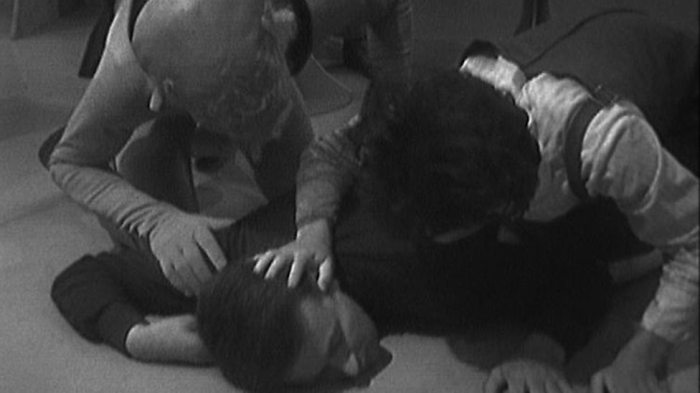
The Doctor and Ian are in trouble. They’ve gone down to explore the aqueduct, but aren’t aware that their map has been doctored (plus their guns are useless). I like the way that when they hear a noise they roll up the map to use as a weapon. Quite how effective a few pieces of paper would have been as a club is something of a moot point.
There’s a characteristic moment when the Doctor burbles on, not heeding Ian’s warnings that they’ve been surrounded! The Doctor and Ian are captured by the survivors of the spaceship which landed ten years ago. They’re a rum lot, to say the least. They’ve spent all this time down in the aqueduct, poisoning the water and patiently waiting for every last Sensorite to die. This single-minded course of destruction has driven them all quite mad, but even though they’ve regressed to a somewhat primitive state (they wield pointed sticks as weapons) it’s interesting that they still retain a rigid hierarchy with a clear chain of command that’s run along military lines.
John Bailey, as the Commander, is able to invest his character with a rather pathetic sense of honour and duty, and he makes quite an impression during the brief time he’s on screen. But Bailey was always a class actor (he returned twice to the series – first as Edward Waterfield in The Evil of the Daleks and then later as Sezom in The Horns of Nimon, where his dignified turn was in sharp contrast to the panto antics from most of the other cast members).
Susan gets a final chance to demonstrate her telepathy and also shares a scene with the First Elder where she reveals a sliver more about her home planet.
1ST ELDER: When I listen to you, you who are so young among your own kind, I realise that we Sensorites have a lot to learn from the people of Earth.
SUSAN: Grandfather and I don’t come from Earth. Oh, it’s ages since we’ve seen our planet. It’s quite like Earth, but at night the sky is a burned orange, and the leaves on the trees are bright silver.
1ST ELDER: My mind tells me that you wish to see your home again, and yet there is a part of you which calls for adventure. A wanderlust.
SUSAN: Yes. Well, we’ll all go home some day. That’s if you’ll let us.
The oddest thing about the conclusion of the story is that we don’t see the City Administrator receive his comeuppance. He just fades away as we’re told that he’ll be banished to the outer wastes. It’s one of those moments, and there are several others during the story, where it’s surprising that David Whitaker didn’t tweak the script a little in order to produce something a tad more dramatically satisfying.
But whilst there are various niggles, overall this is a pretty solid serial. It’s not the most sophisticated or layered tale, but anything with the original TARDIS crew (and indeed, anything with Hartnell) is always going to appeal to me.




